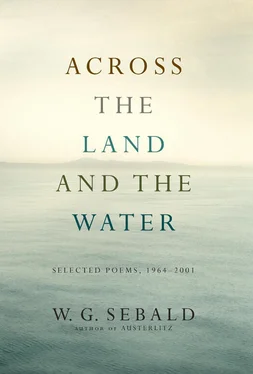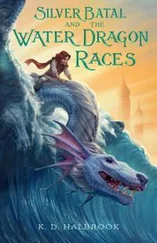30 L’instruction du royPT, SL, H. Title: probably a reference to the posthumously published L’instruction du roy en l’exercise de monter à cheval (1625), by Antoine de Pluvinel (1555–1620). The book was one of the earliest equestrian manuals and is conceived in the form of a conversation between the author, Louis XIII, and Monsieur Le Grand, the King’s Master of the Horse.
31 FestifalPT. the Dictaean Grotto: the Diktaion Andron on Crete, traditionally the birthplace of Zeus. polar dragon: according to Lemprière’s classical dictionary this was the guardian of the apples of the Hesperides; see: J. Lemprière, Bibliotheca Classica , London: 1811 (p. 340). As Ladon, the dragon is depicted coiling around the apple tree; in (ancient Egyptian) celestial atlases he is coiled around the pole of heaven. Could Sebald have been aware of W. B. Yeats’s lines “And though the Seven Lights bowed in their dance and wept, / The Polar Dragon slept, / His heavy rings uncoiled from glimmering deep to deep”? (“The Poet Pleads with the Elemental Powers.”) Somnia, terrores magicos, miracula, sagas, / nocturnos lemures portentaque Thessala rides? are lines from the second book of Horace’s Epistles (ll. 208–9), which Philip Francis, cited by Robert Burton in the Anatomy of Melancholy , translates as “Say, can you laugh indignant at the schemes / Of magic terrors, visionary dreams, / Portentous wonders, witching imps of Hell, / the nightly goblin, and enchanting spell?” See The Works of the English Poets from Chaucer to Cowper , vol. 8, London: 1810 (p. 742). The plump Etruscan blows on an ivory flute in Virgil, Georgics , 2, l. 193, trans. C. Day Lewis, Oxford: 1999 (p. 75). Proteus: an ancient sea god and herdsman of Poseidon’s seal herds. The Sphinx fleeing toward Libya: “I have seen the Sphinx fleeing toward Libya.” See The Letters of Gustave Flaubert 1830–57 , ed. Francis Steegmuller, Harvard: 1980 (p. 112).
32 Pneumatological ProseSL. Flore: see note on “Florean Exercise” above. The animal is a victor: the indented passage is cited from the legend in Dürer’s 1515 woodcut of a rhinoceros. The passage in Sebald’s German text reads: “Das da ein Sieg Thir ist / des Heilffandten Todtfeindt / den wo es Ihn ankompt / so laufft ihm das Thir mit dem Kopff / zwischen die fordern bayn // Sie sagen auch / das der Rhinocerus / schnellfraytig und auch lustig sey.” The legend in Dürer’s woodcut reads: “das da ein Sieg Thir ist / des Heilffandten Todtfeyndt. Der Heilffandt fürchts fast ubel / den wo es Ihn ankompt / so laufft Ihm das Thir mit dem kopff zwischen die fordern bayn / und reist den Heilffandten unten am bauch auff / und er würget ihn / des mag er sich nicht erwehren. dann das Thier ist also gewapnet / das ihm der Jeilffandt nichts Thun kan / Sie sagen auch / das der Rhinocerus / Schnell / fraytig / und auch Lustig / sey.” Footnote: Messrs. H. and C. Artmann: a pun on the name of the Viennese poet H. C. Artmann (1921–2000). as Pliny tells us: Pliny, in book 8 of Naturalis Historia , discusses the character and virtues of the elephant. This passage recurs in modified form in Unrecounted , London: 2004 (p. 13). Footnotes 1 and 2: the footnotes in the German text are reprinted verbatim in the translation.
33 Comic OperaSL. Title: comic opera (komische Oper) can be opera buffa, with its beginnings in the Italian eighteenth century, or the often more serious, or satirical, opéra comique. green theatre: théâtre de verdure, a garden or hedge theatre.
34 TimetableZET, SL, H. Cretan trick: an acrobatic feat of bull-leaping or somersaulting over or between a bull’s horns. Depictions of the ritual, possibly once a rite of passage for young men, have been found in ancient Minoan artwork.
35 UnexploredZET, SL, H. Title: “Unexplored” suggests the white areas that once represented unexplored regions of old maps. horoscope, heptagram, malefic houses: Sebald returns again and again to magic, astrology, alchemy, and the like. photoset: a development in typesetting that allowed characters to be projected onto film for offset printing. The technique had its heyday in the 1960s, when the poem was probably written. The technique may have been the state of the art, and yet the “malefic houses” were still ignored (unexplored). In an earlier version of the poem, the “evil houses” have been whited out and replaced by “white zones” in the school historical atlas.
36 ElizabethanPT, SL, ÜLW, ZET, H. a baker’s daughter: see Hamlet , act 4, scene 5. Ophelia: “They say the owl was a baker’s daughter. Lord, we know what we are, but know not what we may be.” Sheikh Subir: doubts about Shakespeare’s authorship of the plays are recurrent. In one version, it was claimed that he was a Muslim called Sheykh Zubayr (see Muhammad Mustafá Badawi, Modern Arabic Literature , London: 1985, p.191).
37 Baroque PsalterSL. One of several “found” poems by W. G. Sebald, this is taken almost verbatim from a review by Heinz Ludwig Arnold, in Die Zeit (30 June 1972), of the Baroque poet Quirinus Kuhlmann’s (1651–89) so-called Kühlpsalter of 1684: “Nach zahlreichen Bekehrungsreisen nach Paris, Genf, Smyrna und Konstantinopel wurde Kuhlmann in Moskau als politischer Aufrührer verbrannt.”
38 Cold DraughtPT, ÜLW, H. Title: the German Zug can mean, among other things, a train, a draft in the sense of an outline or sketch, the action of drawing air, smoke or liquid, or a current of air. The poem describes a train journey, but the primary sense of the title is probably the icy cultural draft that blows through the narrator’s sensibility as he returns to the scenes of his childhood and place of origin. Sebald’s landscapes are never innocent. Landsberg housed the headquarters of the Kaufering complex of eleven concentration camps, the largest such complex within Germany, and was itself the site of KZ-Außenlage Kaufering I. Kauf beuren was the site of a psychiatric hospital in which the mentally ill were murdered under the Nazi euthanasia program. Between 1939 and 1945, some two thousand patients from Kauf beuren and the nearby Irsee Abbey were deported to their deaths. The Riederloh II camp housed forced laborers who worked at the DAG munitions factory in Kauf beuren. Landsberg is also significant for its prison, where Hitler was incarcerated and allegedly wrote Mein Kampf , and where 275 Nazi war criminals were executed between 1945 and 1951. Could Sebald have been mistaken about Saint Elizabeth ? It was not St. Elizabeth but St. Kunigunde of Luxemburg — whose husband was Heinrich II and the last Holy Roman Emperor of the Ottonian dynasty — who walked over red-hot plowshares unscathed to prove her innocence. Her veil, according to another legend, was said to have prevented the Allies from successfully bombing Bamberg, where she was buried in 1040.
39 Near CrailsheimÜLW. Title: to set an example, Crailsheim was razed by the Americans at the end of the war. The town suffered some ninety percent damage as a result of the bombing after the Germans had successfully retaken it from the Americans in a battle in April 1945. After its destruction, the town was not rebuilt according to historical principles (as was often the case in German restoration) but employing architectural ideas of the 1940s. The descriptions of landscape in the poem exude Sebald’s antipathy for what he would later describe (e.g., in the description of a train journey in the last chapter of Vertigo , or passim in The Natural History of Destruction ) as a repressive German tidiness during the postwar decades, an outward reversal of moral devastation, avoidance of memory, and the inability to mourn. Jehoshaphat: Hebrew, meaning “Jehovah has judged.” For the valley of Jehoshaphat , see Joel: 3, especially verses 2 and 19. The valley, which is also mentioned in After Nature , London: Penguin, 2003 (p. 90), is referred to as the “valley of decision” (Joel 3:14). It is where the Lord assembled those who had afflicted Judah, and wreaked upon them his judgment.
Читать дальше












